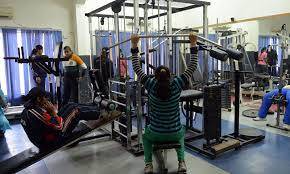
With rising obesity, diabetes, and other diseases among women caused by poor or unhealthy lifestyle factors, it has become necessary to manage these issues through positive lifestyle changes. According to the IDF, Pakistan ranks third on the global diabetes index. As obesity rates rise globally, Pakistani women are also not spared. Worryingly, they show no interest in adopting a healthier lifestyle. There could be several reasons for this.
To begin with, many women mistakenly believe that house-chores count as physical activity. What is not considered is the stress-relief that comes with working out rather than doing housework. Women frequently use their busy schedules, workloads, and childbearing responsibilities as excuses for not working out. They need to know that they can work out at home for 30 minutes only to ensure a healthy physical regime! The misconception that lifting dumbbells and running on a treadmill for hours is the only way to exercise should be dispelled. A quality workout may be done without any equipment.
Another taboo that needs to be addressed is not working out while pregnant. The American College of Obstetrics and Gynecology recommends 30 minutes or more of moderate exercise per day on most, if not all, days of the week unless you have a pregnancy complication such as diabetes, asthma, heart disease, or a history of recurrent miscarriages and early labor. Regular exercise during pregnancy can help reduce back pain and fatigue while preventing gestational diabetes (diabetes that develops during pregnancy).
Furthermore, young women, particularly girls aged 14 to 30, find physical activity unnecessary while suffering from period cycle disruption, PCOs, insomnia, and a variety of other issues. Researchers observed that adolescent women being active for just 1.3 hours per week positively impacted them as they grew older.
Along with women, the government must also pay attention to this problem. The lack of women-only gymnasiums and workout areas, such as parks and playgrounds, is a major barrier for women that needs attention. These areas also require efficient female security guards.
Considering the growing number of people in our country suffering from diabetes and obesity, a national campaign educating people of all ages about physical activity should be launched, which will encourage them and hopefully eliminate toxic cultural taboos.
At the very least, the concerned authorities should renovate existing parks and grounds that are in poor condition. Media channels should regularly stream workout steps in the morning and evening hours for people at home. Finally, I hope that women take physical activity seriously and contribute to living a happy, healthy, and sustainable life.
To begin with, many women mistakenly believe that house-chores count as physical activity. What is not considered is the stress-relief that comes with working out rather than doing housework. Women frequently use their busy schedules, workloads, and childbearing responsibilities as excuses for not working out. They need to know that they can work out at home for 30 minutes only to ensure a healthy physical regime! The misconception that lifting dumbbells and running on a treadmill for hours is the only way to exercise should be dispelled. A quality workout may be done without any equipment.
Another taboo that needs to be addressed is not working out while pregnant. The American College of Obstetrics and Gynecology recommends 30 minutes or more of moderate exercise per day on most, if not all, days of the week unless you have a pregnancy complication such as diabetes, asthma, heart disease, or a history of recurrent miscarriages and early labor. Regular exercise during pregnancy can help reduce back pain and fatigue while preventing gestational diabetes (diabetes that develops during pregnancy).
Furthermore, young women, particularly girls aged 14 to 30, find physical activity unnecessary while suffering from period cycle disruption, PCOs, insomnia, and a variety of other issues. Researchers observed that adolescent women being active for just 1.3 hours per week positively impacted them as they grew older.
Along with women, the government must also pay attention to this problem. The lack of women-only gymnasiums and workout areas, such as parks and playgrounds, is a major barrier for women that needs attention. These areas also require efficient female security guards.
Considering the growing number of people in our country suffering from diabetes and obesity, a national campaign educating people of all ages about physical activity should be launched, which will encourage them and hopefully eliminate toxic cultural taboos.
At the very least, the concerned authorities should renovate existing parks and grounds that are in poor condition. Media channels should regularly stream workout steps in the morning and evening hours for people at home. Finally, I hope that women take physical activity seriously and contribute to living a happy, healthy, and sustainable life.

